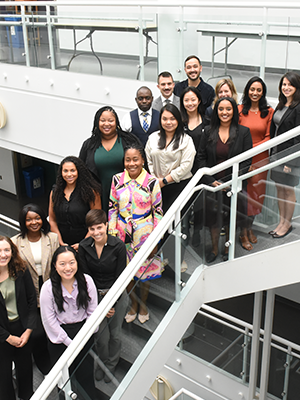October 07, 2022 | Debbie Funk

Drs. Sarah Kattakuzhy and Elana Rosenthal were in the early stages of their careers when medications to cure hepatitis C had come to market, and at the same time, the opioid epidemic was exploding.
They hadn’t yet met, but they’d each realized the same thing: they were treating patients for infections brought on by injecting opioids, but not getting to the root cause of infection, which was drug use.
Today they lead a University of Maryland School of Medicine outreach program aimed at improving patient health and community outcomes for people who often fall through the cracks. It combines compassionate, nonjudgmental clinical care with research to improve care delivery to marginalized populations. They work at the intersection of infections and substance use disorders.
“It is our responsibility to treat the root cause of these infections,” Rosenthal said.
The outreach program, called The Research Initiative on Infectious Diseases and Substance Use (RIIS), is within the medical school’s Institute of Human Virology. Kattakuzhy is an Associate Professor of Medicine and Director of RIIS’s Baltimore program. Rosenthal, an Associate Professor of Medicine, is Director of RIIS’s Washington, D.C. operation. Both doctors joined the staff in 2014. They have a combined staff of 12, including nurse practitioners and study coordinators. All of the research and medical care is done in the communities where patients live.
Contact
Vanessa McMains
Director, Media & Public Affairs
Institute of Human Virology
University of Maryland School of Medicine
443-875-6099
vmcmains@ihv.umaryland.edu
Related stories

Friday, November 17, 2023
Major Funding of Partnership for HIV/AIDS Progress (PFAP) Award from the National Institute of Health (NIH) Office of AIDS Research to the Research Initiative on Infectious Disease and Subst
The Institute of Human Virology (IHV) at the University of Maryland School of Medicine (UMSOM) received an annual award for $3 million funded by the NIH Office of AIDS Research. The PFAP award is projected to total approximately $9 million over four years. Principal Investigators are Elana Rosenthal, MD and Sarah Kattakuzhy, MD, MPH.

Wednesday, May 31, 2023
Baltimore Sun: New UMD School of Medicine institute aims to change addiction treatment and prevention
As the toll of America’s opioid epidemic continues to mount, the University of Maryland School of Medicine is preparing to open a new institute for addiction medicine, where researchers, substance use disorder specialists and doctors will work together to change the way addiction is treated, prevented and studied.The Kahlert Institute for Addiction Medicine, which state and health care leaders announced at a press conference Wednesday, will be housed on the sixth floor of the recently opened Health Sciences Research Facility III on the medical school’s downtown Baltimore campus.

Wednesday, December 21, 2022
Maryland Today: $3.8M NIH Grant Funds Expansion of Researcher’s Opioid Use Recovery Approach to Rural Maryland
A University of Maryland psychologist is taking the peer-based opioid use disorder (OUD) treatment model she and her team developed in Baltimore, Md., to the state’s Eastern Shore with the support of a $3.8 million grant from the National Institutes of Health (NIH). The five-year study by psychology Associate Professor Jessica Magidson and Associate Professor Sarah Kattakuzhy, a physician at the Institute of Human Virology at the University of Maryland School of Medicine in Baltimore, is funded by the NIH HEAL Initiative.

Tuesday, August 09, 2022
Medscape: Hepatitis C Virus Reinfection Uncommon Among People Who Inject Drugs
Reinfection rates are low after treating hepatitis C virus in people taking opioid agonist therapy, even among those who still inject drugs, according to a new study. The findings, which are based on prospective data from 13 countries, including the United States, and were published in Annals of Internal Medicine, should encourage physicians to treat HCV in people with a history of injection drug use.

